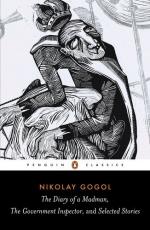|
This section contains 7,506 words (approx. 19 pages at 400 words per page) |

|
In the following essay, author Ronald LeBlanc explores Gogol's gastronomic motif in The Inspector General and examines the play's metaphorical use of eating for power and pleasure.
The subject of gastronomy—as it touches upon the significance of what, how, and why man eats— has begun to receive increasing attention in recent years, during which time quite a number of books on the history of food and drink have appeared. Scholars, moreover, have demonstrated a heightened interest lately in the anthropological aspects of this topic. Since eating is a human activity that by its very nature encompasses a social, a psychological, as well as a biological dimension, the depiction of fictional meals in literature allows this ritualistic event to be transformed into a narrative sign with vast semiotic possibilities—not only within the world of the literary work itself (intratextually) but also within a...
|
This section contains 7,506 words (approx. 19 pages at 400 words per page) |

|




